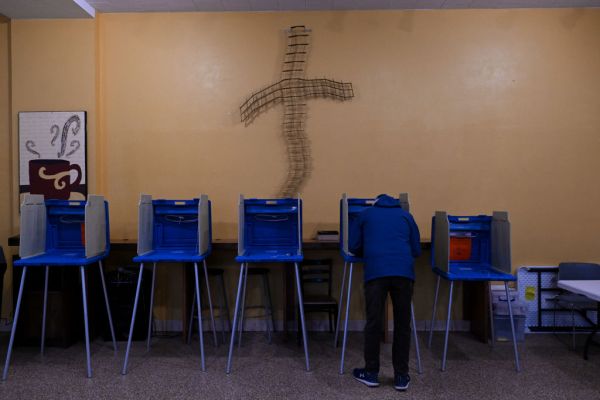Happy Monday! Billionaire and Amazon founder Jeff Bezos is reportedly spending $42 million to build a giant cuckoo clock into the side of a Texas mountain that will tick once a year, chime once a century, and whose cuckoo will emerge once a millennium.
Apparently sometimes the basics don’t cut it.
Quick Hits: Today’s Top Stories
- With Ukraine’s offensive in the Kursk region of Russia set to enter its third week, Ukrainian military forces over the weekend destroyed two bridges in Kursk that could make the transportation of Russian troops and equipment more difficult. Both of the demolished bridges—which crossed Russia’s Seym River—were destroyed by “precision air strikes,” according to Ukrainian air force commanders. Ukrainian officials claimed its forces had advanced across 390 square miles into Russian territory in what Ukrainian President Volodymyr Zelensky said on Sunday was an effort to create a “buffer zone” in Russia. The Washington Post reported Saturday that Ukraine’s offensive derailed planned indirect talks set to take place in Doha, Qatar, this month in an effort to get both sides to agree to cease striking energy infrastructure.
- U.S. Secretary of State Antony Blinken arrived in Israel on Sunday to advance Israel-Hamas ceasefire and hostage release negotiations following discussions last week in Qatar with officials from four different countries—including the U.S. and Israel—but which were not attended by Hamas officials, who were briefed by mediators instead. U.S., Egyptian, and Qatari officials said Friday they’d presented Israel and Hamas with a proposal that “bridges remaining gaps,” but Hamas on Sunday released a statement rejecting the draft agreement’s terms. Speaking from Tel Aviv on Monday morning, Blinken described talks in Cairo this week as “probably the best, maybe the last, opportunity” to secure a deal.
- Israeli officials announced on Saturday the Israel Defense Forces (IDF) had killed two senior Hamas terrorists in an air strike in the West Bank city of Jenin, both of whom were believed by Israeli authorities to have helped plan a terrorist attack in the region last week that left one Israeli civilian dead.
- Meanwhile, masked Israeli settlers killed a Palestinian civilian late on Thursday night in an attack on Jit—a Palestinian village in the northern region of the West Bank. Israeli officials quickly condemned the attack. “I take seriously the riots that took place this evening in the village of Jit, which included injury to life and property by Israelis who entered the village,” Israel Prime Minister Benjamin Netanyahu tweeted on Friday. “Those who fight terrorism are the IDF and the security forces, and no one else.”
- The Supreme Court issued an emergency ruling on Friday upholding two separate federal appeals court decisions that temporarily block the Biden administration from implementing Education Department rules expanding the meaning of Title IX to make discrimination against transgender students a violation of Title IX as part of gender identity discrimination. The Education Department’s new rules—issued in April—quickly faced legal challenges from ten Republican-led states in two separate lawsuits, and Friday’s ruling will temporarily block the rules from taking effect until the cases are decided.
- Ben Sasse, a former Republican senator from Nebraska and University of Florida (UF) president, on Friday pushed back against allegations that his office spent university funds inappropriately during his tenure, following a report from the school’s campus paper that highlighted expenses paid under Sasse’s leadership. “Many have asked whether it’s true if UF over the last couple years had inappropriate spending. No, it’s not true,” Sasse tweeted, while acknowledging there was “substantial funding” for a number of new initiatives he was “happy” to defend. “Our alumni, donors, and hardworking taxpayers should be confident that such stewardship and oversight have been and are being exercised. They are.” One day before Sasse’s statement, Republican Gov. Ron DeSantis’ office had told the Miami Herald that it was investigating the allegations with university officials and the state’s board of governors. Sasse unexpectedly stepped down from his role as UF president last month after about a year and a half on the job, citing his wife’s health and family obligations.

Mark Twain once observed (possibly apocryphally) that, “History never repeats itself, but it does often rhyme.” Democrats are surely hoping for no repetition and as little rhyming as possible as they head into their party’s national convention in Chicago, which kicks off pronto—uh oh.
The festivities will mark the second time the Second City has hosted the Democratic National Convention since 1968, and the similarities to that event are already eerie: Vice President Kamala Harris is taking over as candidate after President Joe Biden announced his decision not to seek reelection, in much the same way that then-Vice President Hubert Humphrey became the Democratic nominee after then-President Lyndon B. Johnson declined to run again. The Democratic Party is also facing an internal conflict over a foreign war and antiwar activists are threatening to disrupt the convention—just like they did 56 years ago.
But the similarities likely end there: Harris has far more support within the party than Humphrey did, and the lineup of speakers points toward a convention that will look more like a coronation than a floor fight. Harris, however, remains a mostly empty vessel for various Democratic factions’ hopes as she very slowly rolls out her policies. Former President Donald Trump’s campaign, meanwhile, is seeking an attack that lands on the increasingly popular Democratic ticket even as both candidates lean into kitchen-table economic populism and try to saddle each other with blame for the high cost of living.
Harris has been building momentum in the polls since she took over at the top of the Democratic ticket almost a month ago, though the race remains close: A Washington Post-ABC News-Ipsos poll of registered voters released Sunday found Harris leading nationally at 49 percent to Trump’s 45 percent in a head-to-head matchup, within the poll’s margin of error. Among Harris voters, 62 percent said they support her “strongly”—up from 34 percent of Biden’s own backers—and her -10-point net job approval rating, while underwater, is significantly better than Biden’s net approval of -18. However, on voters’ top two issues, the economy and inflation, Trump leads by 9 points.
For that reason, the last week of campaigning for both candidates has been all about “the economy, stupid.” At rallies in North Carolina and Pennsylvania, and at a press conference at his golf club in New Jersey, the former president was ostensibly there to talk economics, even as he veered wildly off-topic or looked visibly bored while reading prepared remarks. “They wanted to do a speech on the economy,” he said in North Carolina on Wednesday, seeming to refer to his campaign aides, many of whom have come under fire as Trump sinks in the polls. “They say it’s the most important subject. I’m not sure it is.”
In New Jersey, Trump’s most energetic moments came when discussing personal triumphs and grievances—like his debate against Biden and the various court cases he faces—and during tangents on favorite subjects like the inefficiencies of electric cars and the threat wind farms pose to natural landscapes.
As Trump’s campaign aides seek to prod their principal to stay focused on attacking Harris’ record, it remains to be seen whether he is even interested in sticking to a game plan. The former president, as he often does, said the quiet part out loud toward the end of Thursday’s press conference: “All we have to do is define our opponent as a Communist, or a socialist, or somebody that’s going to destroy our country.”
Harris, for her part, gave her first policy address on Friday to lay out the economic proposals underpinning what she called the “opportunity economy.” While taking credit for lowered inflation and federal investments in manufacturing, she acknowledged that “many Americans don’t yet feel that progress in their daily lives.”
The vice president said bringing down costs would be a “top priority.” She introduced a plan to pass the “first-ever federal ban on price gouging on food,” a policy of price controls that many economists consider counterproductive. She also promised to take big swings on increasing housing affordability—where the federal government generally has little power—including proposing what effectively amounts to subsidizing demand by providing first-time homebuyers with $25,000 for their down payment.
Harris said that her administration would restore the Earned Income Tax Credit and the Child Tax Credit, including $6,000 in tax relief to families with a child under a year old. Harris did not say how she would pay for these tax cuts or her down-payment assistance plan. She also made some jabs at her opponent, declaring that he would raise healthcare prices and labeling his proposed tariff a “Trump tax.”
The convention will provide plenty of airtime to throw some punches at Trump and his running mate, Sen. J.D. Vance of Ohio. The headliners—a who’s who of Democrats—are already set. Tonight, Biden and former Secretary of State Hillary Clinton will both speak. All eyes will be on the president, as he has played a limited role in Harris’ presidential campaign so far. On Thursday, they both appeared at a joint event in Maryland to deliver remarks on the economy, during which the crowd began chanting, “Thank you, Joe!”
The Harris campaign has largely departed from both the content and tone of Biden’s campaign, while only nodding at the dismal spirits of Democrats before Harris took over at the top of the ticket. “It almost feels like everyone is coming out of their house after a blizzard,” Harris’ running mate, Minnesota Gov. Tim Walz said in a campaign video with Harris last week.
Biden also has a bit of a tightrope to walk during his speech. How much credit will he give Harris for his administration’s accomplishments? Will he seek to portray her as a fresh start, even if that means conceding his own unpopularity relative to her recent boost? And how will he publicly justify his decision to not seek reelection?
On Tuesday night, former President Barack Obama will speak, followed by former President Bill Clinton on Wednesday. Walz will speak after Clinton, and then Harris will deliver her acceptance speech on Thursday, the final night of the convention
Democrats will attempt to project a unified front, though planned protests could spoil the sunny illusion. While smaller demonstrations focused on LGBTQ rights, abortion, and economic issues are expected, the largest protests, by far, will be those concerning American support for Israel’s war against Hamas in Gaza. This issue became a flashpoint on the American left after the wave of campus protests during the last academic year, a well-publicized movement to vote “uncommitted” in Michigan and other states’ Democratic primaries to punish Biden for his support of Israel, and clashes among Democratic members of the House of Representatives.
The anti-war protests are being organized under the umbrella group March on the DNC, a coalition of “grassroots” groups that “fights for the rights and liberation of oppressed people and against the exploitation of workers.” Their chief demand is an end to U.S. aid for Israel. The group expects tens of thousands of people to attend the protests and won a court battle this July to demonstrate “within sight and sound” of the convention, although the protests’ organizers contend that the route allowed by a federal judge last week was insufficiently long.
The protests will likely be large, and will certainly be visible, but will they matter? “Democrats may not be as supportive of Israel as the nation as a whole, but they are not nearly as sympathetic to the pro-Palestinian protest movement as the party of their grandparents’ was of the anti-Vietnam activists,” Chris Stirewalt wrote Friday. “As a string of primary losses for anti-Israel candidates shows, Democrats are not hungry for radicalism here.”
Still, antiwar protesters have made themselves heard already at Harris rallies. In one of the young campaign’s viral moments, protesters interrupted the vice president during a rally in Detroit on August 7, chanting “Kamala, Kamala, you can’t hide, we won’t vote for genocide.”
Harris—who’s considered to be to Biden’s left on Israel—responded, breaking from prepared remarks. “If you want Donald Trump to win, then say that,” she said. “Otherwise, I’m speaking.” Rally attendees responded with thunderous applause.
Harris has signaled a willingness to break slightly with Biden’s staunch support for Israel. Prior to the Detroit rally, she invited the leaders of the “Uncommitted” movement—activists seeking to convince voters to vote “uncommitted” on their primary ballots—to meet with her and discuss their concerns. She also skipped Israeli Prime Minister Benjamin Netanyahu’s address to Congress last month, attending an event with a historically black sorority instead. Harris met with Netanyahu privately and in her statement following the meeting expressed dismay at the humanitarian conditions in Gaza.
Harris’ attempt to avoid taking a clear position on Israel’s war in Gaza seems of a piece with her broader reluctance to make specific policy commitments at this point in her campaign. As Nick Catoggio put it last week, the campaign so far—on both sides—has been a “show about nothing.” It remains to be seen if the convention will do anything to change that.
Worth Your Time
- Ukraine’s destruction of the Nord Stream pipelines may not have been the act of strategic sabotage it initially appeared to be, Bojan Pancevski reported for the Wall Street Journal. “It was the kind of outlandish scheme that might bubble up in a bar around closing time,” he wrote. “In May of 2022, a handful of senior Ukrainian military officers and businessmen had gathered to toast their country’s remarkable success in halting the Russian invasion. Buoyed by alcohol and patriotic fervor, somebody suggested a radical next step: destroying Nord Stream. … One of the most audacious acts of sabotage in modern history, the operation worsened an energy crisis in Europe—an assault on critical infrastructure that could be considered an act of war under international law. … Now, for the first time, the outlines of the real story can be told. … Ukrainian President Volodymyr Zelensky initially approved the plan, according to one officer who participated and three people familiar with it. But later, when the CIA learned of it and asked the Ukrainian president to pull the plug, he ordered a halt, those people said. Zelensky’s commander in chief, Valeriy Zaluzhniy, who was leading the effort, nonetheless forged ahead.”
- More than a dozen people in New Brunswick, Canada, have been afflicted with a strange neurological disease—and no one knows why. “The symptoms belonged to a broad spectrum of neurological disorders, but there was always something starkly atypical about the patients’ presentation,” Greg Donahue reported for the New York Times Magazine. “Their decline was too swift, or not swift enough; they lacked key indicators of a particular disease; or they failed to respond to known therapies, a hallmark of how neurologists diagnose conditions. Even more alarming, many of the patients were unusually young. … At the heart of the matter is the question of whether something in the environment may be responsible, at least in part, for the onset of the patients’ illness. It’s a question that underscores not only the tangled relationship between public health and patients’ rights, but also the inherently confounding nature of neurological conditions. In the absence of answers, what began as a puzzling medical mystery has been transformed into a situation rife with suspicion: accusations of nefarious plots to silence doctors, scientists’ leaking internal documents and a growing community of patients and advocates intent on proving the government’s hand in a coverup.”
Presented Without Comment
New York Times: Free Vasectomies and an Inflatable IUD, Abortion Rights Advocates Hit the D.N.C.
While delegates are in Chicago for next week’s Democratic National Convention, they will engage in the typical pageantry and traditions: They’ll vote for their nominee, pose for photos with elected officials, and show off their state with cool buttons or themed hats.
They will also have the option of getting a free vasectomy or a medication abortion just blocks away.
A mobile health center run by Planned Parenthood Great Rivers, which serves much of Missouri and part of southern Illinois, plans to park itself near the convention and offer those services early next week to anybody who makes an appointment, delegate or not. (There is so much interest in the vasectomy appointments, I’m told, there is already a waiting list.)
Also Presented Without Comment
Former President Donald Trump, speaking in Wilkes-Barre, Pennsylvania, on Saturday:
I am much better looking. I’m a better-looking person than Kamala. They said, ‘No, her biggest advantage is that she’s a beautiful woman.’ I’m going, huh? I never thought of that. I’m better looking than she is.”
Also Also Presented Without Comment
ART News: Mark Zuckerberg Unveils 7-Foot Statue of Wife Priscilla Chan by Daniel Arsham
In the Zeitgeist
Sometimes, artists treat every new album as an opportunity to reinvent themselves—to enter a new era, as it were. Others, however, are content to be exactly as they’ve always been. Such is the case with blues musician Ray LaMontagne, who put out a new album last week that is exactly the languid, melodic, guitar-driven record we’ve come to expect.
Toeing the Company Line
- In the newsletters: The Dispatch Politics crew dug into Trump’s unorthodox ground game strategy, Nick worried (🔒) that we’re living through 2016 all over again, Jonah panned Harris’ price-control gambit, Chris compared (🔒) the upcoming DNC in Chicago to its 1968 predecessor, and Paul D. Miller outlined in Dispatch Faith how Christians can think about voting in line with their theological values.
- On the podcasts: Jonah ruminated on the 2016 election on The Remnant, while Michael debuted a new video podcast format to interview Jake Meador about his recent Dispatch Faith essay on postliberalism.
- On the site over the weekend: Cole reviewed the newest installment in the Alien franchise, Michael Lucchese argued Pride & Prejudice has a place in the American canon, and Kevin said Megan Basham’s Shepherds for Sale is “bog-bottom dumb.”
- On the site today: Chapman University historian Kyle Longley draws comparisons between Joe Biden and Lyndon B. Johnson—and their decisions to end their respective presidential campaigns.
Let Us Know
What, if anything, are you hoping to learn about Kamala Harris and her campaign during the Democratic National Convention this week?












Please note that we at The Dispatch hold ourselves, our work, and our commenters to a higher standard than other places on the internet. We welcome comments that foster genuine debate or discussion—including comments critical of us or our work—but responses that include ad hominem attacks on fellow Dispatch members or are intended to stoke fear and anger may be moderated.
With your membership, you only have the ability to comment on The Morning Dispatch articles. Consider upgrading to join the conversation everywhere.